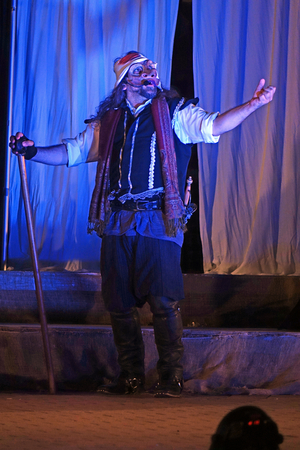Review: ShakesCar's CYRANO Has Ample Eloquence but Faulty Amplification

Not surprisingly, Edmond Rostand was a theatrical reactionary. His most famous drama, Cyrano de Bergerac, was the last play written in verse or poetry that is still widely revived. The verse plays of William Butler Yeats, Maxwell Anderson and Archibald MacLeish have long since fallen by the wayside, but Rostand's throwback along with his more whimsical Les Romanesques, transmuted into the evergreen musical, The Fantasticks, still endure.
But lately, Rostand's original French text has been buffeted by film and stage adaptations that take us far from the playwright's classic Alexandrine couplets - and the Brian Hooker verse translation that Jose Ferrer immortalized playing the title role. My last brush with a traditional Cyrano was in 1997 in an Off-Broadway production, when Frank Langella heroically took the title role in an abridged rendering of the Hooker translation.
The Anthony Burgess version, performed in SouthEnd by Epic Arts Repertory Theatre in 2004, took some liberties with parts that the translator didn't fancy - and Laura Depta took on the title role, liberating it from traditional menfolk. So it's been awhile since Charlotte has seen a traditional Cyrano, though the opera composed by David DiChiera, presented here by Opera Carolina late in 2017, reminded us of the huge scale and tapestry that Rostand imagined.
You won't find comparable operatic grandeur in the SlimFast CYRANO adapted by Jason O'Connell and Brenda Withers, presented outdoors at the Winthrop Amphitheater by Shakespeare Carolina. Among the 44 "persons" catalogued in the original cast list are groups of cadets, poets, pastrycooks, pages, and musicians. After all these, Rostand calls for citizens, musketeers, thieves, children, Spanish soldiers, intellectuals, academicians, nuns, etc. O'Connell and Withers distill these multitudes into a script that ShakesCar presents with a cast of five - fewer people than you'll see onstage in any precious little revival of The Fantasticks.
Naturally, O'Connell and Withers keep those five actors very busy in multiple roles. Even James Cartee, who will settle into the role of Cyrano, appears in a curiously updated prologue, falling off a ladder and setting off an ambulance-vs.-Uber debate on how to get him to a hospital. Stefani Cronley, off my radar since her debut in Fahrenheit 451 two years ago, must moonlight as a cadet when she isn't Roxane, the beautiful lady of surprising depth and courage who absorbs Cyrano's undeclared love and Christian's inarticulate rapture.
Christian is fairly stunning himself, which may explain why Daniel Brown reappears as Sister Marthe when he has finished wooing Roxane. S. Wilson Lee also has an interesting array of roles; including Montfleury, a bogus poet whom Cyrano mocks; DeGuiche, a powerful noble who stalks Roxane; and Ragueneau, a friendly baker. The scenes we remember best from traditional productions, the moonlit scene in Roxane's courtyard and the finale 15 years later at the Ladies of the Cross Convent, don't really suffer dramatically from the O'Connell-Withers compression.
On the other hand, the remaining scenes were conceived on a grand scale. Cyrano heckles and denounces Montfleury at a theatrical presentation, he has an ill-fated triste with Roxane and meets Christian for the first time amid a hubbub of impoverished poets at Ragueneau's bakery. And the unique love triangle climaxes at a besieged castle defended by Cyrano, Christian, and the cadets of Gascoyne. These are the scenes where Rostand's multitudes are normally deployed.
This CYRANO also applies the shears to our hero's swordsmanship and literary prowess, so Monsieur De Bergerac doesn't sensationally compose a ballade at Winthrop while outfencing and casually slaying a hapless enemy - and Cyrano's gazette gets short shrift in the final scene. There is simply less reason here to admire and fear this dashing cavalier.
But the new script occasionally rhymes, and Cartee gives Cyrano ample eloquence. He wears a mask of his own design to underscore his ugliness, and his pacing is perfection when he verbally demolishes the simpleton who has the nerve to declare that Cyrano's nose is outsized - with 20 or more elegant and witty self-deprecating descriptions he improvises on the spot. Confronting Roxane, he is timidity and deference, abashed by his own repulsiveness, yet with a touch of élan. He grows noticeably bolder under the cover of darkness when he woos his beloved on Christian's behalf.
Chris O'Neill's costume and scenic design prove adequate for the more intimate scenes, largely because of the strength of his stage direction and Danny Wilt's deft lighting. Until the end, when I felt that Cronley was a bit monochromatic in her weepiness, I was nicely swept into Roxane's impetuous vigor. Dealing with Cyrano and Christian, Cronley's eager energy dispelled any suspicion that Roxane was stupid, and the scenes with Christian were always pitch-perfect.
Of course, it's Christian who readily strikes us as more dimwitted than Roxane at first, but Brown convincingly rides the tide of enlightenment that happens to this young buck as he becomes better and better acquainted with both Cyrano and Roxane. Montfleury and DeGuiche are akin in their foppishness and prissiness with Lee in both roles, which turns out to be quite fine, since De Guiche's predatory lechery and his worldly power adequately supply sharp distinctions. Lee's gentle geniality as Ragueneau also helps keeps things afloat and affecting at the end.
What may sink ShakesCar's production for those less familiar with Rostand is the quirky performance of the sound system. Nearly all of the time, I could hear the players whether or not their microphones were working at that moment. But the in-and-out of the amplification, often in the space of a single line, gets to be annoying and distracting - a possible obstacle to understanding if this is your first encounter with this classic. I could only marvel how the entire cast soldiered through this adversity unfazed.
Hopefully, electronic glitches won't mar the remainder of the run, for this compressed CYRANO certainly has plenty of panache.
Photos by Perry Tannenbaum
Reader Reviews
Videos

